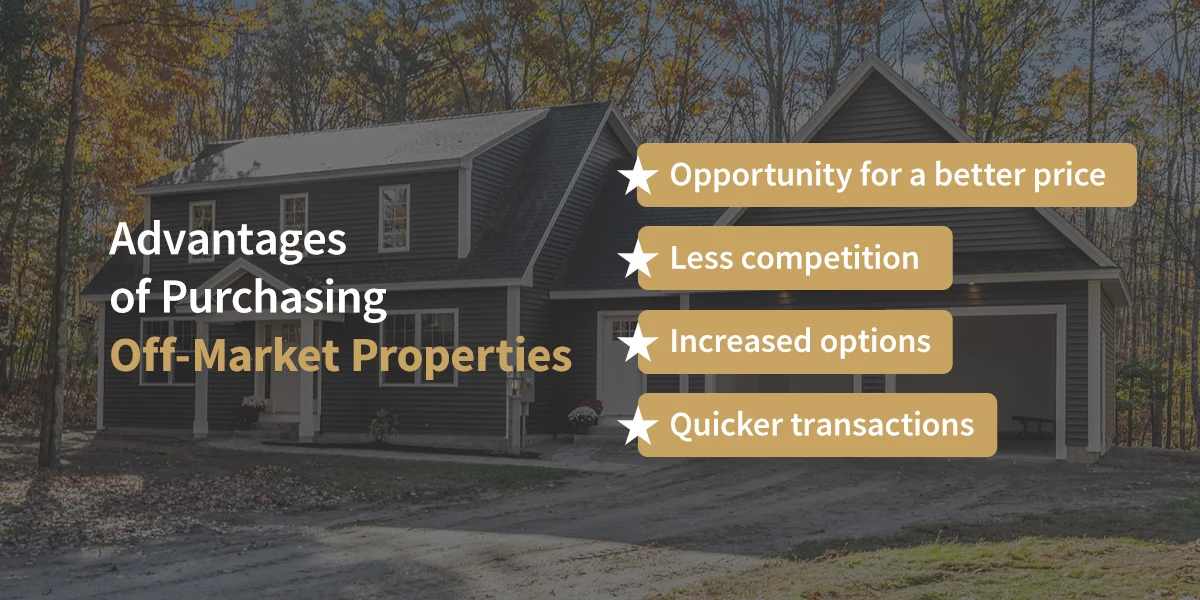In real estate investing, conversations often center around “the market.” We often hear terms like market value, seller’s market, rental market, on the market and more.
But what about the term “off-market”? With so much focus on the market, what does being off-market have to do with real estate investing?
By consulting national data, current policies and market trends, we’ll take a comprehensive look at off-market properties and determine the best way to tap into these near-secret real estate investment deals.
What Are Off-Market Properties?
An off-market property is a property that is not publicly listed for sale or marketed online or through yard signs. These properties won’t appear on databases such as the Multiple Listing Service (MLS), but this doesn’t mean they aren’t for sale. Most off-market property sellers negotiate directly with real estate investors and buyers to sell their properties, which is especially common in competitive locations.
Why Do Property Owners Sell Properties Off-Market?
With the scope and reach of the MLS, one may wonder why a homeowner would be motivated to sell off-market. Every situation is different, but here are a few of the more common reasons:
- Maintain privacy. Sellers may be wary of a public sale due to some kind of personal or financial hardship, such as a divorce or bankruptcy. Also, if the property is rented, they may want to keep the sale private from tenants. For some owners, the idea of all the open houses and showings that come along with a public sale may seem overwhelming.
- Test the market. Some sellers may be open to a public sale eventually, but they want to test the market to gain feedback on the condition or price before listing on the MLS. These sellers may do a “For Sale By Owner” (FSBO) posting first and then make adjustments before going public.
- Avoid commission costs. Real estate agents take a percentage of property sales as commission. By selling a home directly to buyers, property owners avoid this cost. Sellers can also negotiate a lower sales commission when working with only one agent.
Understanding Off-Market Real Estate Deals
The term “off-market” can mean different things in the real estate industry, depending on the context. It is important to understand these nuances in how people and platforms describe off-market properties.
Off-Market Listings on Property Search Websites
On front-facing property search websites like Zillow or Realtor, a home is categorized as off-market when there is no for-sale data available.
Home search websites pull their data from the MLS, real estate agents, public records and sellers themselves (FSBO), but those sources can present an incomplete picture of what’s possible for sale.
So Zillow’s “off-market” categorization doesn’t necessarily mean a home is unavailable for purchase.
What Investors Mean by “Off-Market” Properties
Investors often find the best deals by actively searching for properties beyond those listed on the MLS. Closing on a home purchase transaction that was never listed on the MLS is called an “off-market” deal by investors.
The implementation of the National Association of Realtors (NAR) 8.0 Clear Cooperation Policy means that traditional sales are almost always listed on the MLS. But there are instances where real estate investment deals can happen without a real estate agent or broker listing the property on the MLS. We’ll discuss how to find these off-market real estate deals below.
What Is a “Temporarily Off-Market” Listing?
All active listings in the MLS must be available for showings by definition. If there’s a portion of time when the seller does not wish for their property to be shown, their real estate agent can change the status to “temporarily off-market.”
This status change does not mean that the property can be considered for an off-market sale, as far as investment buyers go. It usually just means that the seller is making some repairs, or perhaps they’re entertaining house guests on holiday. The seller is still in contract with their listing agent — they’re just taking a break from active showings.
What Real Estate Professionals Mean by “Pocket Listing”
Pocket listing is a term that’s sometimes used interchangeably with off-market, but the focus is a little different. Pocket listing usually refers to a property that’s marketed privately by a real estate agent. Rather than publicly listing the property on the MLS, the agent will try to sell it directly to clients within their brokerage.
The NAR 8.0 Clear Cooperation policy now prohibits agents from advertising pocket listings outside their brokerage, so with the right connections, these private offerings can present a great opportunity for select investors. (Hint: make connections with local agents so this can be you!)
What Does “Coming Soon” Mean in Real Estate?
“Coming soon” in real estate means the property is not available for showing or purchase for a designated period of time. Sometimes, agents will first post a house as “coming soon” to generate interest.
Realtors use “coming soon” to avoid increasing days on the market. This strategy can be effective for luxury homes that typically take longer to sell.
Do Off-Market Properties Make Good Investments?
Off-market properties can absolutely make good real estate investments, as long as a buyer does their due diligence. Investors need to be well-acquainted with determining fair market values, capitalization rates, rates of return and after-repair values before placing offers on an off-market property.
The Pros and Cons of Purchasing an Off-Market Property
As with any investment decision, the advantages should be weighed against the disadvantages before jumping in.
Advantages of Purchasing Off-Market Properties

Real estate agents, flippers and investors look for off-market deals for several reasons, some of which include:
- Opportunity for a better price. The main reason to purchase off-market comes down to the numbers. Some off-market sellers value discretion over money, which can be a financial advantage to the buyer. The seller may also reduce the price of their listing if they’re paying lower commission fees thanks to a pocket listing or direct sale.
- Less competition. Without widespread advertising, the pool of buyers decreases, which can help you avoid a major bidding war.
- Increased options. Getting creative with off-market searches increases the available properties for your consideration. Having more options can be extremely valuable, especially in a seller’s market where inventory is slim and competition is high.
- Quicker transactions. When you buy a home directly, you’ll potentially avoid long bidding wars and other things that make sales take longer. This is crucial if you want to buy properties fast.
Disadvantages of Purchasing Off-Market Properties
While off-market deals are great for investors, they also have some disadvantages you need to consider before deciding. A few drawbacks are:
- Skewed market value. Just because a house is off-market doesn’t automatically mean it’s a good deal. With less competition, market value can take on a more subjective quality. Therefore, buyers should take care to run independent analyses prior to purchase.
- Increased time commitment. Tracking down potential off-market properties can be extremely time-consuming. Often, properties can only be found at the buyer’s initiative, and even then, the deal may not work out.
- Upfront expenses. Off-market properties may have issues that require immediate capital expenditures. To locate potential properties, marketing, membership and lead generation expenses must also be taken into account.
Finding Off-Market Properties
According to NAR data, 90% of homes are sold via the MLS, so finding good off-market properties isn’t easy.
Given the scarcity of off-market properties, investors must utilize creative strategies to optimize their success. Often, it’s best to employ a few different strategies at the same time in order to increase your chances of finding a viable off-market property.
Here are a few ways you can increase your chances of finding off-market properties:
Network
Build relationships with contractors, builders, real estate agents and even fellow investors in your local area. Often, they are the first to get tips on properties that could become good off-market sales. You can grow your network by attending real estate events, joining online groups or contacting real estate agents directly. When you build these relationships and let them know exactly what you’re looking for, they can notify you when they find something that matches your criteria.
Check Public Records
State and local government websites sometimes contain information about pre-foreclosure or short-sale properties, as well as expired listings. These scenarios may present an opportunity to contact the owners directly for a potential sale. Check in frequently to find houses that could become available.
Use Direct-Mail Marketing
Sometimes, homeowners don’t know they’re ready to sell until they’re presented with an opportunity. If you find a house you’re interested in buying and want to take a chance, write a postcard or letter to inform owners of your desire to purchase their property and send it to them.
Search for Distressed and Abandoned Properties
The boots-on-the-ground strategy involves driving around looking for distressed or abandoned properties. You can identify distressed properties by their condition — properties with boarded windows and an overgrown yard are usually vacant or the owners can’t afford the upkeep. Write down the address of these homes, and look up the owners to contact them for a possible sale.
Seek a Wholesaler’s Help
Real estate wholesalers find properties to buy, put them under contract and then assign the sale to a new buyer for a premium. Wholesalers can be an investor’s easiest avenue to off-market deals. Yes, wholesalers take a cut as the middleman, but they also do all the legwork to find, negotiate and close deals –– a decent tradeoff.
Visit Auctions
Real estate auctions can be great opportunities to purchase bank-owned properties. Sellers also turn to auctions to sell their properties fast. To find off-market property auctions, look at online auction sites and build relationships with local auctioneers and real estate agents. They can tell you if a property you’re interested in is up for auction. Properties listed for auction are typically sold as-is, so be sure to do your research first to discover what issues there are and if you’re willing to accept them.
Search Online
Real estate websites list all the properties you can find on the MLS, but they can also put up listings for off-market properties. Look out for categories such as FSBO and “coming soon” to find good deals, and sign up for alerts so you’re the first to know about a new listing. You can also check classified advertising sites for homes sold directly by the owner, but be aware that anyone can create a listing on these sites — including scammers. Do your homework and avoid any offers that are too good to be true.
Implement Word-of-Mouth Marketing
If you’re in the business of flipping or interested in real estate investment, talk to everyone about it — including those who aren’t directly related to the industry. Word-of-mouth is a powerful marketing tool, as you never know what connections your network has. If someone you know discovers an off-market property, they’re more likely to think of you and tell you first because of your relationship.
Trust New Western to Help You Find Off-Market Listings
When balanced with other investment strategies, off-market properties can be an effective way to grow a real estate portfolio, especially in a hot seller’s market when traditional purchases can become more frustrating. Off-market properties are not without headaches, but some additional work upfront can pay off in big discounts at the closing table.
If you’re searching for an off-market property, New Western’s services can make the process a lot easier. We are the largest private real estate investment marketplace, serving over 150,000 investors. We work closely with you to identify your goals and strategies and then alert you about properties that match your criteria.
To begin, contact us today through our online contact form, and we’ll get in touch within 48 hours for a no-obligation call.








